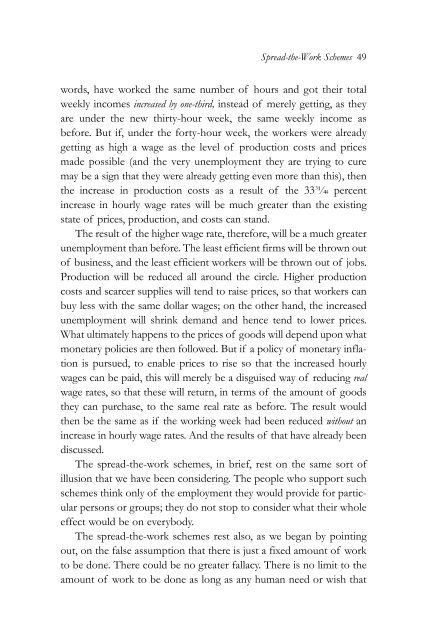1gDdM7w
1gDdM7w
1gDdM7w
- No tags were found...
Create successful ePaper yourself
Turn your PDF publications into a flip-book with our unique Google optimized e-Paper software.
Spread-the-Work Schemes 49words, have worked the same number of hours and got their totalweekly incomes increased by one-third, instead of merely getting, as theyare under the new thirty-hour week, the same weekly income asbefore. But if, under the forty-hour week, the workers were alreadygetting as high a wage as the level of production costs and pricesmade possible (and the very unemployment they are trying to curemay be a sign that they were already getting even more than this), thenthe increase in production costs as a result of the 33 3 ¼4 percentincrease in hourly wage rates will be much greater than the existingstate of prices, production, and costs can stand.The result of the higher wage rate, therefore, will be a much greaterunemployment than before. The least efficient firms will be thrown outof business, and the least efficient workers will be thrown out of jobs.Production will be reduced all around the circle. Higher productioncosts and scarcer supplies will tend to raise prices, so that workers canbuy less with the same dollar wages; on the other hand, the increasedunemployment will shrink demand and hence tend to lower prices.What ultimately happens to the prices of goods will depend upon whatmonetary policies are then followed. But if a policy of monetary inflationis pursued, to enable prices to rise so that the increased hourlywages can be paid, this will merely be a disguised way of reducing realwage rates, so that these will return, in terms of the amount of goodsthey can purchase, to the same real rate as before. The result wouldthen be the same as if the working week had been reduced without anincrease in hourly wage rates. And the results of that have already beendiscussed.The spread-the-work schemes, in brief, rest on the same sort ofillusion that we have been considering. The people who support suchschemes think only of the employment they would provide for particularpersons or groups; they do not stop to consider what their wholeeffect would be on everybody.The spread-the-work schemes rest also, as we began by pointingout, on the false assumption that there is just a fixed amount of workto be done. There could be no greater fallacy. There is no limit to theamount of work to be done as long as any human need or wish that


